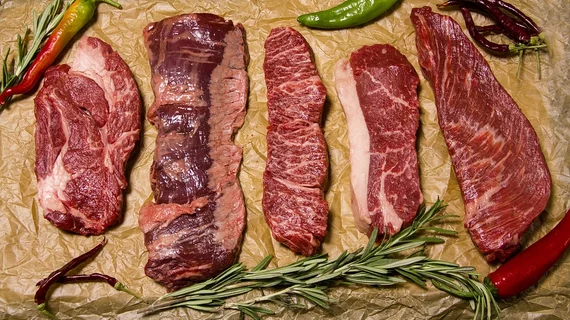Consuming large amounts of meat may increase your risk of CVD, heart disease
People with a high body mass index (BMI) who consume large amounts of meat may be at an elevated risk for cardiovascular disease (CVD), according to preliminary research presented at ESC Congress 2021.
The team noted that the association between saturated fat and CVD risk was unclear in prior studies. Their findings, however, point to a possible explanation that takes the food source into account. They took close look at how saturated fat from a variety of foods correlates with ischemic heart disease, stroke, and total CVD.
“We found that saturated fat from meat may be associated with a higher risk than other food sources, in part because those consuming large amounts of meat also had a higher BMI than low consumers,” Rebecca Kelly, MD, of the University of Oxford, said in a statement.
In addition, she added, it "is not possible to determine whether this is because of a specific impact of saturated fat from meat on BMI or because those with a higher BMI consume more meat. In addition, it is difficult to fully disentangle whether part of the effect of saturated fat on cardiovascular disease may be through higher LDL cholesterol in this cohort because cholesterol-lowering medication use is high in UK adults.”
The researchers tracked 114,285 participants from the UK Biobank study. None of the participants had CVD when the analysis began.
The group’s eating patterns were assessed to determine their typical consumption of total saturated fat and saturated fat from different foods, including dairy and meat. Body measurements and lifestyle patterns were also considered.
Study participants were followed for almost nine years to see whether they developed CVD. During the follow-up period, total CVD, heart disease, and stroke occurred in 4,365, 3,394 and 1,041 people, respectively.
Taking into account multiple lifestyle, socioeconomic and medical factors, data were analyzed to determine if there were any links between consumption of total saturated fat or saturated fat from different foods and CVD outcomes.
The authors found that there were no clear associations between total saturated fat and CVD outcomes. Nevertheless, consuming 5% higher total energy from saturated fat from meat was linked with significant higher risks of total cardiovascular disease and heart disease. These associations did not stay significant after taking BMI into account, however.
“We recommend following the dietary guidelines advice to consume less than 10% of daily energy from saturated fat," Kelly said. "Our findings emphasize the importance of studying the different food sources of saturated fat when examining risk of CVD. Further research is needed to ensure that these observations were not influenced by dietary or non-dietary factors that were not measured in this study."
More information related to ESC Congress 2021, a virtual conference hosted by the European Society of Cardiology, is available here.
